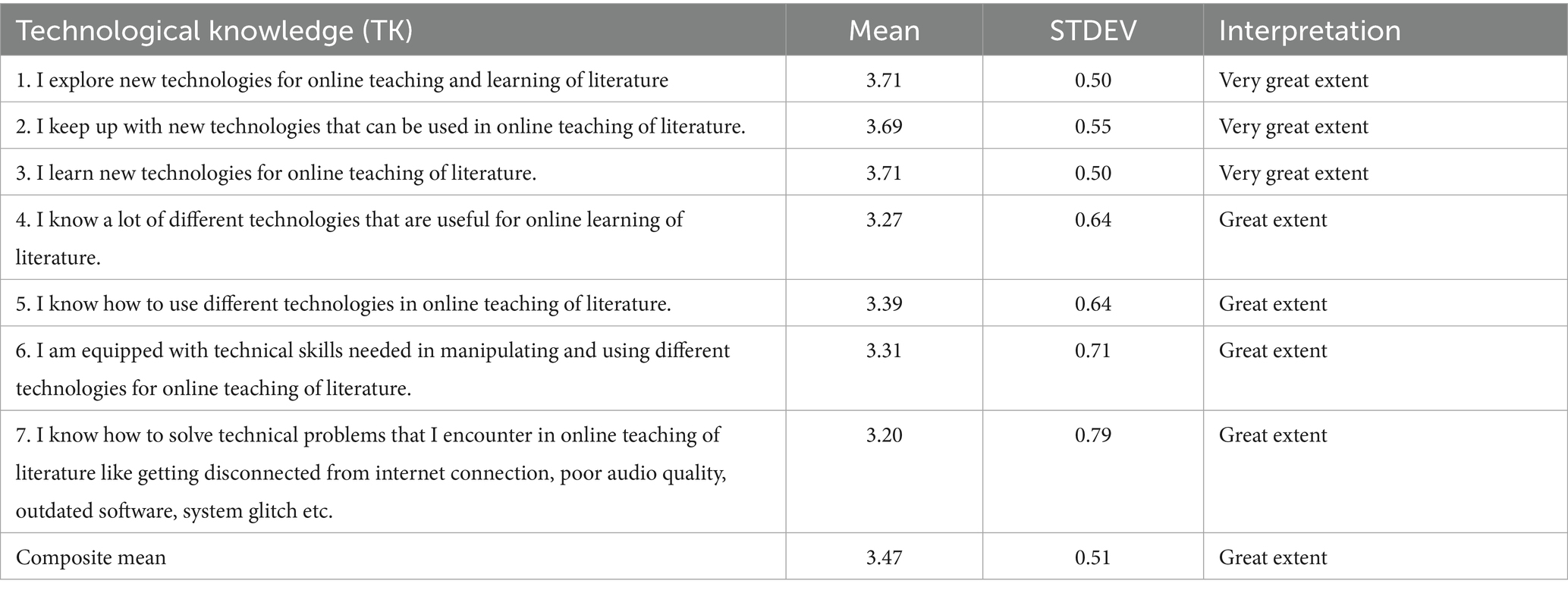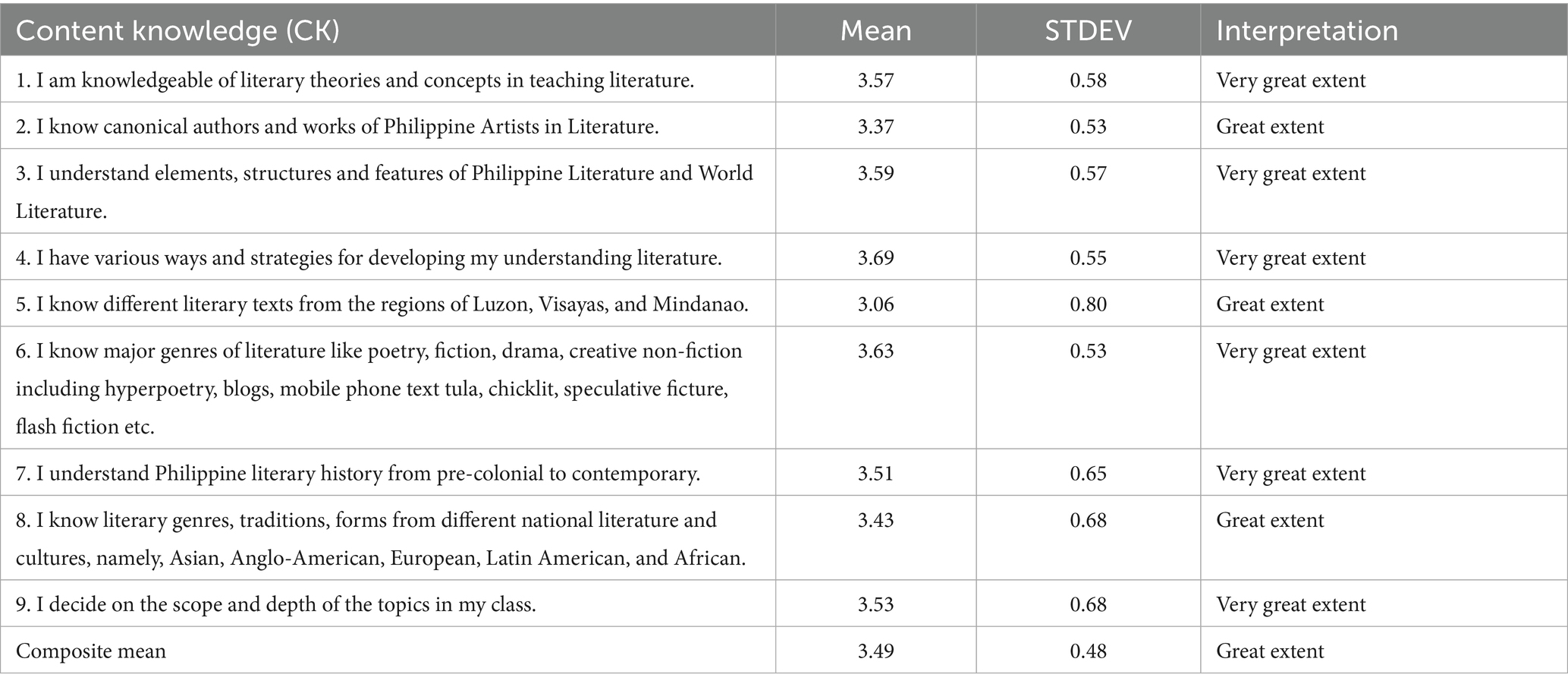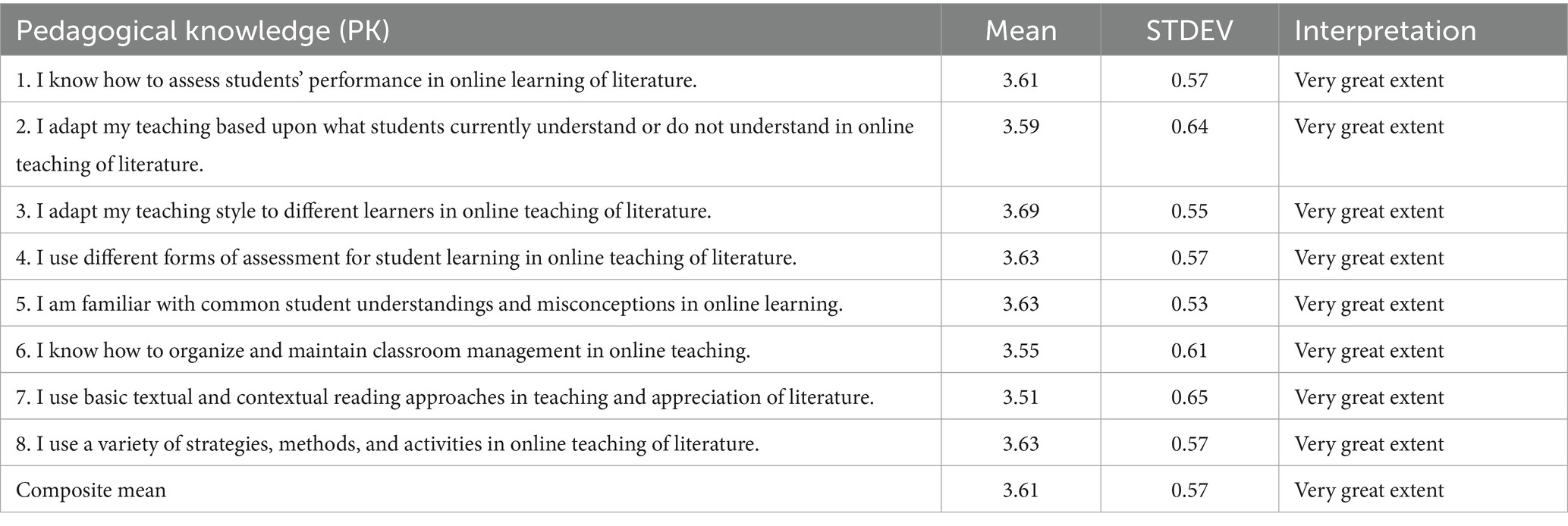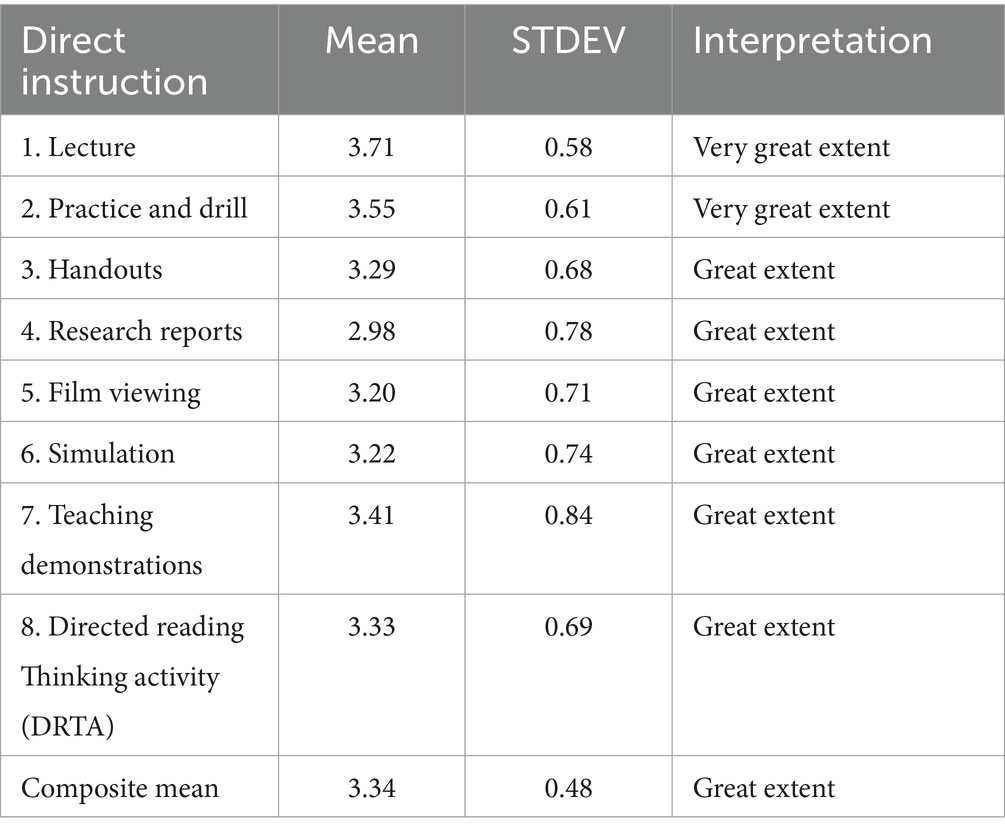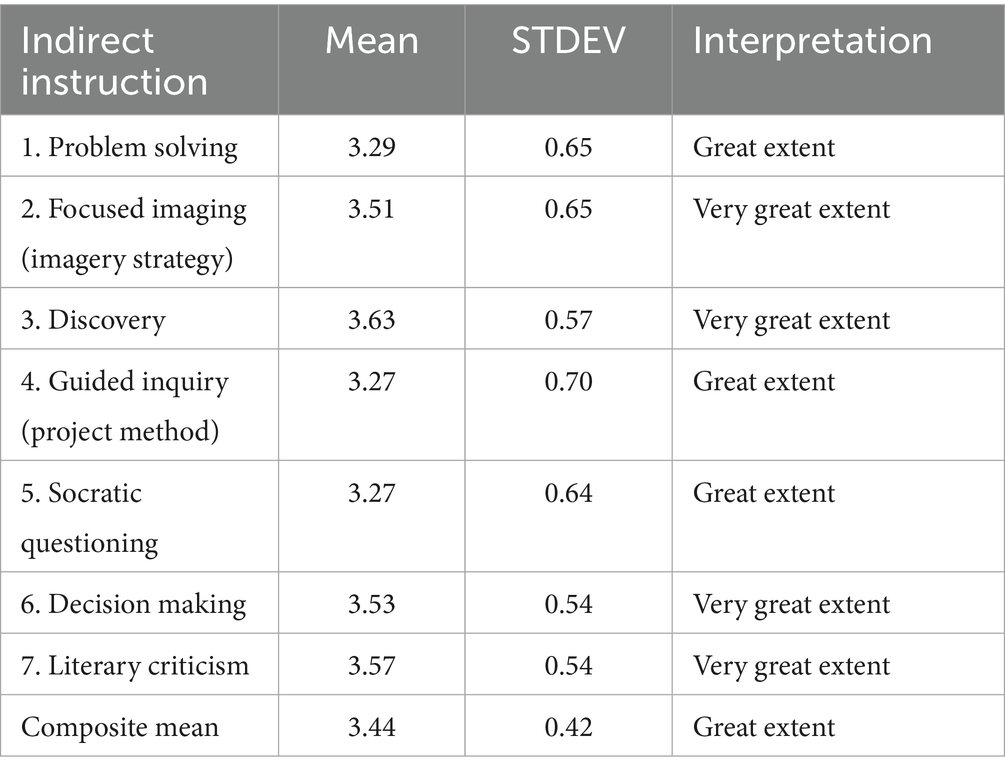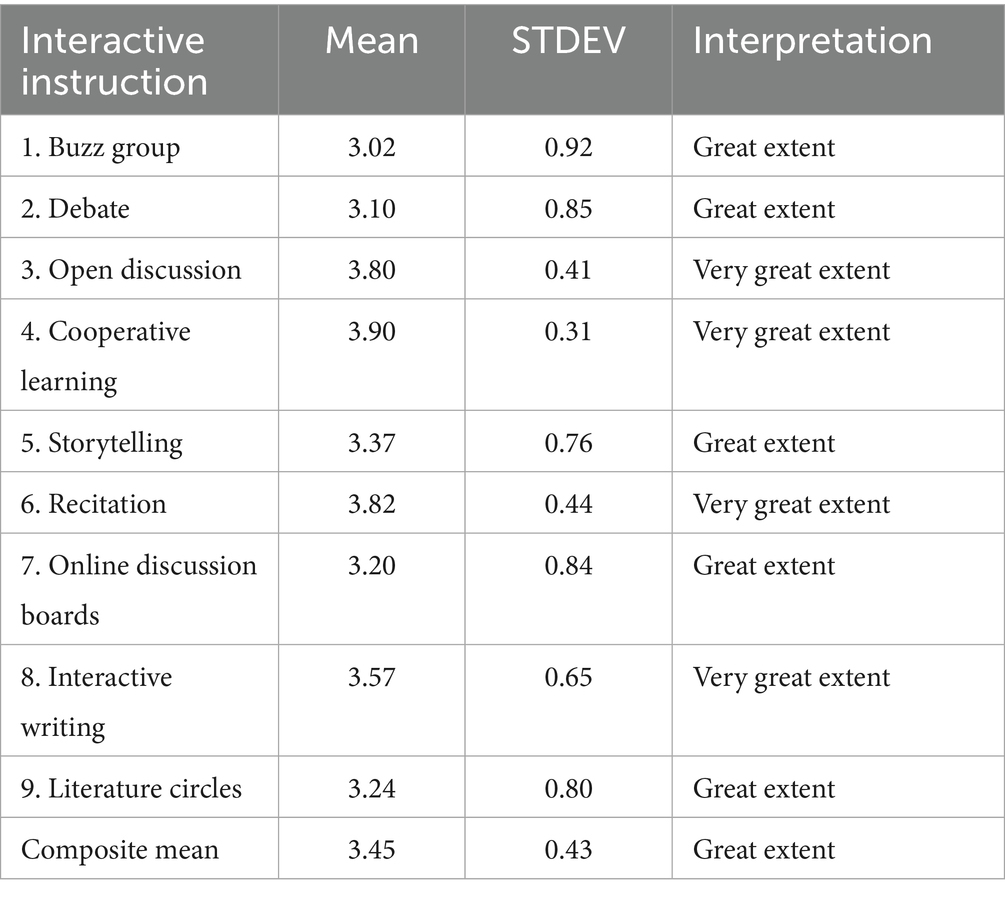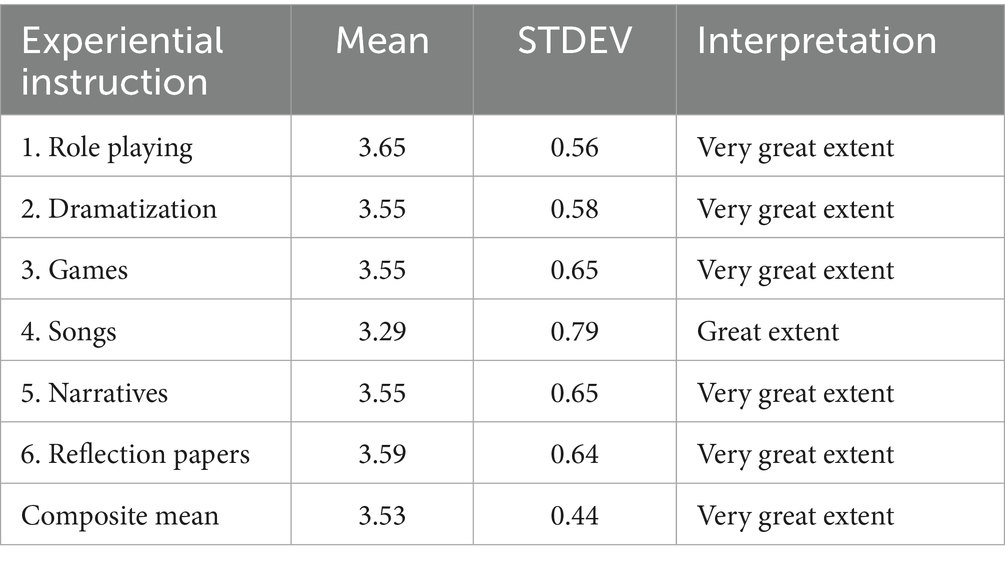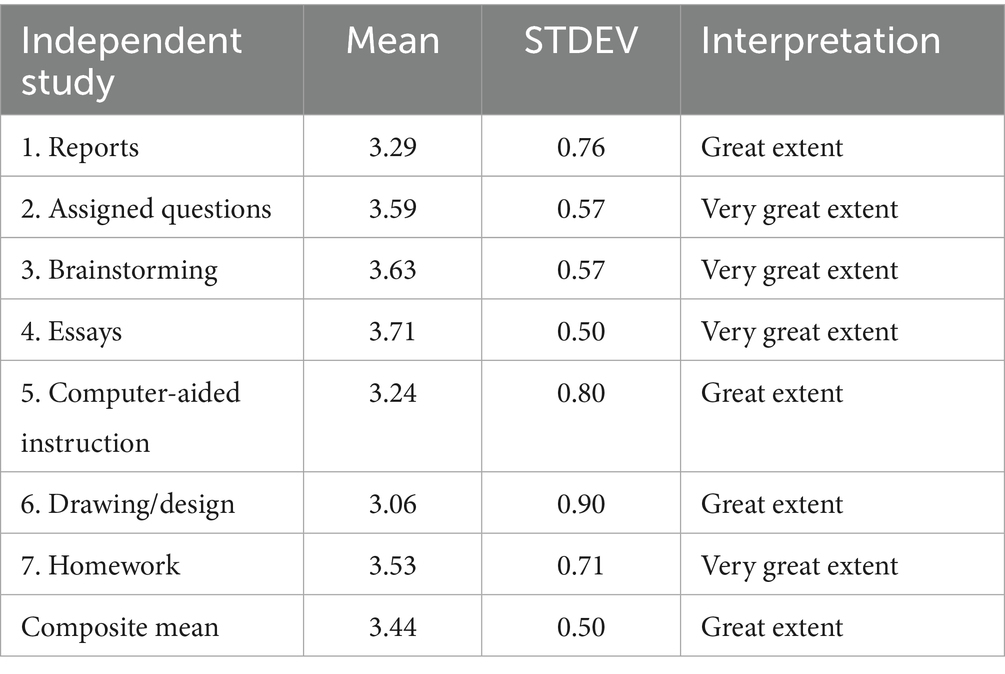- 1Manado Independent School, Kalawat, Indonesia
- 2College of Teacher Education, Batangas State University, Batangas City, Philippines
This study aimed to develop Technological Pedagogical Content Knowledge (TPACK)-based lesson exemplars for 21st Century Literature of the Philippines and the World (21st CLPW) and investigate teachers’ perceived manifestation of their knowledge of content, pedagogy and technology and their extent of utilization of technology tools and strategies in the online teaching of literature. It used the Technological Pedagogical Content Knowledge Framework, which supports technology integration and lesson development across subject areas. It also surveyed a total population of 49 senior high school English teachers from private schools and a public university in Batangas City. Descriptive research method was utilized to analyze and interpret data. The findings revealed the respondents demonstrate their pedagogical knowledge to a very great extent while they manifest their technological knowledge and content knowledge to a great extent. Moreover, productivity tools were the most useful in the three stages of reading of online literature lesson while the most utilized strategies were lecture method, discovery method, cooperative learning, role-playing, and essays. Furthermore, there was a significant positive relationship between the extent of utilization of technology tools in the pre-reading and during-reading stage of online literature lesson and the extent of utilization of strategies under direct instruction, indirect instruction, interactive instruction, experiential instruction and independent study, while only interactive instruction had no significant relationship with the extent of utilization of technology tools in the post-reading. The study designed lesson exemplars for the online teaching of 21st CLPW and provided insights to teachers about technology integration and lesson development.
Introduction
After the COVID-19 pandemic, various learning institutions have continued to utilize online learning modality together with face to face instruction as a means to deliver education to students across subject areas. This signifies how technology integration is crucial in the teaching and learning process. In particular, technology integration has influenced today’s landscape of teaching literature in the Philippine setting.
Teaching literature shifted from traditional physical classrooms to online learning at the height of COVID-19 pandemic. Literature teachers had to adapt their pedagogy, instructional material preparation and lesson development to teach in online classes. There were several challenges that surfaced particularly in teaching literature through online learning amidst the pandemic. According to Robosa et al. (2021) literature teachers were not fully prepared to teach online due to their lack of training and experience in teaching online. Furthermore, Aringay and Napil (2023) stated that teachers faced challenges in transportation and communication, learner’s difficulty of understanding the lessons, and poor quality of outputs from students in teaching literature during the pandemic. Despite these challenges, they.
were able to cope through acceptance of learning conditions and self-encouragement; collaboration with fellow teachers; and resourcefulness in monitoring students.
Teaching literature requires effective lesson development through instructional material preparation and lesson planning. Moreover, the knowledge of teaching literature is reflected on how teachers design appropriate lessons. Teachers may focus on lesson development to ensure they will be able to use sound strategies, utilize technology tools, and employ assessment activities in order to enhance the quality of teaching and learning in physical and online classrooms.
The Technological Pedagogical Content Knowledge (TPACK) Framework supports technology integration and lesson development. This framework emphasizes the importance of integrating technology into teaching and highlights that the interrelationship between teachers’ knowledge of technology, pedagogy and content. Also, it recognizes the need for teachers to design with effective teaching strategies, appropriate learning activities and suitable technology tools. Applying the TPACK framework in the online teaching 21st Century Literature of the Philippines and the World (21st CLPW) may help teachers make relevant pedagogical decisions in designing relevant and appropriate lessons.
Aside from integrating the TPACK Framework in teaching literature in the Philippine context, there is also a pressing need to conduct further studies. Studies on language are significantly higher than the research in literature (Aquino, 2018) pointed out that teaching literature in the Philippine context is problematic because of the little academic interest given to it, evident in the available studies on literature teaching in high school.
There are only limited published studies that focused on the teaching of 21st CLPW in senior high school. Some of these published researches focused on criteria in text selection in Philippine and World Literature (Bañez, 2016), standards in the selection of instructional materials (Bulusan, 2019), instructional practices and assessment activities (Ladeza, 2018), integration of task-based instruction (Parcon, 2022), and strategies and challenges under blended learning (Bobila and Daing, 2025).
Conducting more research in teaching 21st CLPW is significant as it can shed light on how to improve teaching practices and enhance the learning experiences of students both in the physical and virtual classrooms. Furthermore, teachers can examine possible instructional practices, teaching strategies, and challenges in their teaching. Discovering more about these concepts is significant to innovate the landscape of teaching literature. Lastly, further research may contribute and expand the existing body knowledge in teaching 21st CLPW in different modalities.
Considering the need to integrate a framework in designing lessons for online teaching of 21st CLPW and the existing research gaps in teaching literature in the Philippine context, the researchers embarked on exploring the instructional strategies and technology tools employed by teachers in order to develop lessons appropriate in the online teaching of 21st CLPW.
Objectives
This study sought to develop TPACK-based lesson exemplars in the online teaching of 21st century Literature of the Philippines and the World. Furthermore, it aimed to assess respondents’ teacher knowledge, their use of technology tools and strategies in teaching literature through online learning. Specifically, this study aimed to achieve the following objectives:
1. Assess the extent to which teachers manifest the following dimensions of the TPACK framework relative to teaching literature: technological knowledge, content knowledge, and pedagogical knowledge.
2. Determine the extent of utilization of technology tools used in online teaching in the following stages of reading: pre-reading, during reading, and post reading.
3. Assess the extent of utilization of strategies in teaching literature under the following categories: direct instruction, indirect instruction, interactive instruction, experiential instruction, and independent study.
4. Test the relationship between the extent of utilization of technology tools used in online teaching and the extent of utilization of strategies used in teaching literature; and
5. Develop lesson exemplars that integrate the TPACK framework in the teaching of 21st Century Literature of the Philippines and the World.
Materials and methods
This study employed descriptive research design, specifically the survey method with quantitative approach. Through survey design, this study was able to describe teachers’ perceived knowledge of technology, content, and pedagogy, and assess the extent of utilization of strategies and technology tools in the online teaching of literature. Also, it enabled the study to assess the relationship between the extent of utilization of teaching strategies and technology tools in the online teaching of literature.
The study gathered data from a total population of 49 senior high school English teachers from the private schools and a public tertiary level institution in Batangas. They were selected as respondents because they teach the core subject 21st CLPW through online learning amidst the pandemic.
Data gathering instrument
The main data gathering instrument of this study is a survey questionnaire constructed by the researchers. Before its construction, a pre-survey was conducted to determine the specific strategies and technology tools that teachers use in teaching literature under online learning. The results were used as bases for the items to be included in the actual instrument.
The first part of the questionnaire included some of the items that were based on the instrument developed by Elas et al. (2019) to assess teachers’ perceived extent of manifestation of their knowledge of technology, content and pedagogy. There were seven items on teachers’ technological knowledge; nine items on content knowledge that were based on the DepEd curriculum for the subject 21st CLPW; and eight items on teachers’ pedagogical knowledge.
The second part of the instrument was composed of items on the assessment of the extent of utilization of eight categories of technology tools in the three major parts of the lesson namely pre-reading, during reading, and post reading. Some of the categories of technology tools included were based on the study conducted by Meehan (2025) on Teacher Use of Digital Tools.
Meanwhile, the third part of the data gathering instrument included the assessment of the extent of utilization of strategies in teaching literature classified as direct, indirect, interactive, experiential, and independent study. Most of the strategies were adapted from the study conducted by Gordonas (2018) while some strategies are based on other related researches. There are eight direct instruction strategies, seven indirect instruction strategies, nine interactive instruction strategies, six experiential instruction strategies, and seven strategies from independent study.
The questionnaire was validated by five experts to ensure that its content was comprehensible, appropriate and aligned to the objectives of the study. After validation, the questionnaire was administered to 20 junior high English teachers for pilot-testing through Google form link to test its validity and reliability. They were the respondents of the pilot-testing since the total population of the senior high school English teachers from private schools and a public university in Batangas City was relatively small.
The responses to the items in the three parts of the questionnaire were scored using a four-point scale to measure the extent of perceived manifestation of the respondents’ teacher knowledge as well as the extent of utilization of technology tools and instructional strategies in online teaching of literature. The scale includes 4 as Very Great Extent (VGE), 3 as Great Extent (GE), 2 as With Extent (WE), and 1 as No Extent (NE).
Data gathering procedure
After the pilot-testing, a formal letter of request for data collection addressed to the principals/ research officers/ concerned officials of private schools and a public university that offer senior high school level in Batangas City were sent.
The instrument was disseminated in printed format or through exclusive google form links to the respondents through the help of the school official-in-charge. The respondents’ consent to participate in the data collection was secured. Furthermore, the gathered data were treated with outmost privacy, anonymity, and confidentiality.
The data were sent to the expert statistician who ran the necessary statistical treatment namely composite mean, standard deviation and Spearman rank. The results were analyzed and interpreted. The data provided insights on teachers’ perceived knowledge of technology, content and pedagogy together with their utilization of strategies and technology tools in teaching literature under online learning. The data collected were used as bases to design TPACK-based lesson exemplars in the online teaching of 21st Century Literature of the Philippines and the World.
Results and discussion
This study assessed teachers’ perceived manifestation of their knowledge of technology, pedagogy, and content as well as their extent of utilization of technology tools and strategies in the online teaching of literature in order to design TPACK-based lesson exemplars for 21st CLPW.
Teachers’ perceived extent of manifestation of the three major components of the TPACK framework
As the teaching of literature was done online during pandemic, there was a need to assess teachers’ perceived manifestation of the three major components of teacher knowledge in order to understand if teachers possessed the important knowledge that they need to successfully teach literature online.
In terms of technological knowledge (TK), teachers had very great extent of manifestation in exploring and learning new technologies in online teaching and learning of literature. In contrast, they manifested their knowledge of solving technical problems that they encounter while teaching online only to a great extent. Overall, teachers believed that they manifest technological knowledge to a great extent.
These findings suggest that teachers are encouraged to study new tools and experiment on them in order to determine which among these tools will be useful and effective in online teaching of literature. Furthermore, it is important for teachers to know how they can solve problems that they may encounter while using technology tools. Teachers need more training in teaching with technology and using technology for online modality (Whalen, 2020).
The results also support the recommendation of Haleem et al. (2022) that teachers have to utilize all online resources to ensure that their lessons are relevant, interesting, and up to date. Teachers’ technological knowledge plays a crucial role on how teachers can design and make important decisions on students’ learning experiences.
In terms of content knowledge (CK), the respondents manifest to a very great extent their knowledge on various ways and strategies for developing their understanding of literature. In contrast, they had great extent of manifestation of their knowledge of different literary texts from the regions of Luzon, Visayas, and Mindanao. In general, the respondents believed that they had great extent of manifestation in terms of their content knowledge.
Since Philippine literature is rich with various literary texts from different regions, literature teachers may not be familiar with all the regional collection of literary texts. Furthermore, regional literary texts are written in local language or dialect of the writers. This can also affect teacher’s familiarity and understanding of these regional literary texts since they may not be well-verse in all regional dialects and can only rely to translated versions. In connection, Bañez (2016) recommended that literature teachers may consider recency and relevance as criteria in selecting suitable literary texts in teaching 21st CLPW.
The findings are connected to the results of Cremin et al. (2009) that teachers with enriched content knowledge were able to create an informed and strategic purpose in choosing and using literary texts to support learners’ reading pleasure. Having a rich knowledge of content enables teachers to design and plan activities suitable for online teaching of literature (Tables 1–3).
Aside from TK and CK, teachers’ pedagogical knowledge (PK) was also examined. Teachers adapt their teaching style to different learners and that they use a variety of strategies, methods and activities including different forms of assessment for student learning in online teaching of literature. They are also aware of common student understandings and misconceptions in online learning. Overall, teachers had very great extent of manifestation in terms of their pedagogical knowledge.
The findings signify that teachers’ teaching style varies depending on the type of learners. They adjust their instruction and teaching style based on their students’ level and skills. Also, they recognize the importance of adapting their pedagogical practices based on the context of learning to accommodate students’ learning needs as well as their understanding students’ perception and misconception of online learning. The overall findings also suggest that teachers believed that they are equipped with strong PK as it is crucial in terms of lesson development and effective execution of lessons.
In addition, the results of the study are related to the study of El-Sabagh (2021) that adaptive e-learning based on learning styles can enhance student engagement and learning outcomes. Furthermore, the findings also support (Martin and Bolliger, 2018) who discovered that learners valued strategies the most which facilitate teacher and student interaction. Moreover, the study emphasized the importance of using student-centered strategies to foster engagement in online learning.
In conclusion, literature teachers perceived that they exhibit mostly with great extent their knowledge of technology, content, and pedagogy.
Utilization of technology tools in the three stages of a literature lesson
The use of technology tools affects how teachers can teach literary texts to the learners. Table 4 presents the findings on the extent of utilization of technology tools in the pre-reading, during-reading, and post-reading stage.
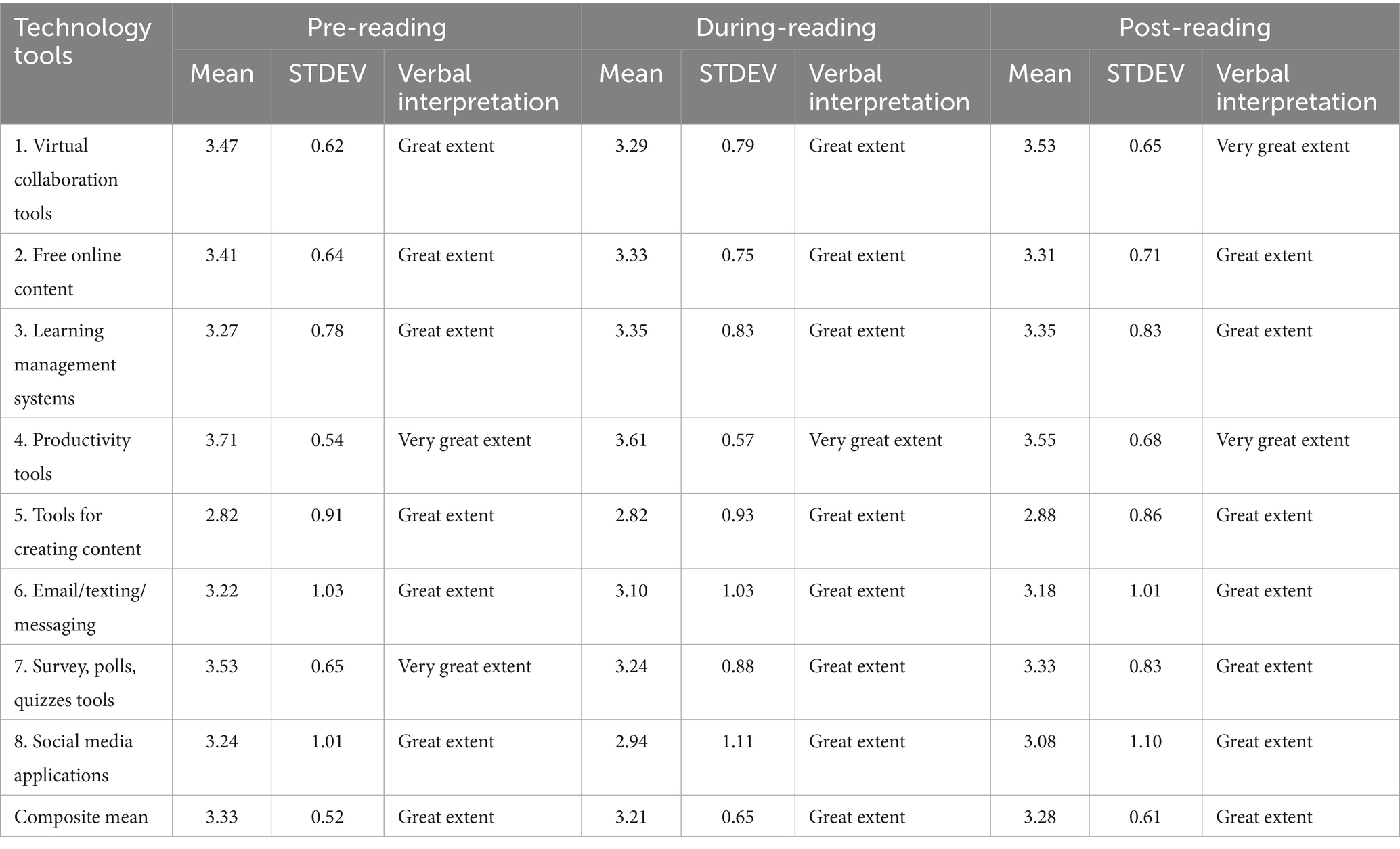
Table 4. Extent of utilization of technology tools in the pre-reading, during-reading and post-reading stage.
Productivity tools obtained the highest score and were considered the most useful while tools for creating content scored the lowest and were utilized only to a great extent among the technology tools in the in the pre-reading, during-reading, and post-reading stage of online literature lesson. In general, technology tools were utilized to a great extent in the three reading stages of online literature lesson (Table 5).
The findings signify that teachers rely heavily on productivity tools for instructional delivery as they have been used in the three major parts of the literature lesson. They maximize the flexible features of productivity tools to prepare students before reading, engage them as they process and analyze the text while reading, and enable them to relate their personal experiences and apply what they have learned in real life context after reading. Moreover, their ease of access, convenience and efficiency may have been a factor why teachers use them in the three stages of online literature lesson.
Productivity tools can incorporate images, audio, and videos which can be a good source of background information to contextualize reading and to motivate the learners to read. Moreover, they include an array of features that provide teachers with more options to stimulate students’ interest, tap on their prior knowledge, and execute vocabulary activities as support before reading. These productivity tools may be accessed through computers and laptops or through applications installed in tablets and mobile phones. Furthermore, learners can also use these tools as they read and process literary texts. Through these tools, they can also work on their post-reading tasks or output as application of what they have learned from the text.
In contrast, content creation tools may not be that useful in helping the students to understand, analyze, and interpret the topic or literary texts before and during the reading of literary texts. They may not be able to support the learners while reading as they are focused on reading between the lines, analyzing deeper meanings and ideas embedded in the text, and interpreting complex concepts and abstract ideas. Moreover, they were used the least since they require teachers and students to study specific features before they can use them to create content. Moreover, users need to explore how to manipulate them in order to fully maximize them in virtual classes.
The results also support the findings of Meehan (2025) that productivity tools are also effective in instructional delivery and student engagement while tools for creating content are effective only for instructional planning. Furthermore, the integration of these productivity tools which are under Web 2.0 tools in classroom instruction expedites the accomplishment of learning tasks and provides opportunities for student collaboration (Olea, 2019).
Extent of utilization of different strategies under different types of instruction
The online teaching of literature requires teachers to employ different strategies which is a reflection of their pedagogical knowledge. There are strategies that are used in face-to-face learning that can also be utilized in teaching literature online.
Among the strategies under direct instruction, lecture and practice and drill were used by the teachers to a very great extent in online teaching of literature while film viewing and research reports were only employed to great extent but with the least mean. Generally, strategies under direct instruction were utilized to a great extent.
With virtual collaboration tools, teachers were still able to conduct lecture in online teaching of literature. This suggests that they may find this strategy useful to teach literary concepts in online classes. Moreover, it may be efficient to use lecture method to deliver lessons particularly topics in literature that are knowledge-based to emphasize commonalities and differences of concepts.
Meanwhile, practice and drill may be useful for teachers in teaching poetry to learners as it enables students to master the piece of literature through repetition and practice. Furthermore, it is another way for students to practice their skills in reciting poems and conducting speech choir.
In contrast, teachers may consider film viewing useful only to a great extent because of certain limitations of this strategy like time constraints, availability of films as adaptations of literary texts and the faithfulness of the adaptation of the texts. Despite these limitations (Guıeb and Cruz, 2017), concluded that film viewing is an effective in teaching and learning literature as it helps learners understand the dynamic of events in a story.
Although conducting research reports was determined as the least useful, teachers may utilize it as a spring board in teaching students how they can gather relevant information regarding the literary topics and texts that they analyze in class.
The results pertaining to the use of lecture method support the study of Gordonas (2018) and San Jose and Galang (2015). Lecture method most often used by professors as it effective in teaching classes with large number of students (Gordonas, 2018). In addition, lecture was the most effective strategy for by both teachers and university students (San Jose and Galang, 2015).
Under indirect instruction, discovery method obtained the highest score followed by literary criticism, both of which were utilized to a very great extent. In contrast, Socratic Questioning and Guided Inquiry scored the lowest but were used to a great extent. Overall, teachers maximized strategies from indirect instruction to a great extent.
The findings signify that teachers employed more learner-centered strategies to engage students in learning literature through online learning Moreover, these strategies enable learners to practice inquiry and construct new ideas by means of discovery.
In connection, using discovery method may help students create deeper analysis of literary texts since they have to generate their ideas and form their own analysis and response to literary texts with the help of the learning materials provided during instruction. Furthermore, it promotes critical thinking while learners are engaged in the learning process (Jayanti, 2021). Likewise, literary criticism allows students to practice critical thinking by means of viewing and understanding different literary texts guided by different literary theories (Appleman, 2023). This also encourages students in having multiple perspectives which is a very important skill in a diverse classroom.
In contrast, teachers may still use guided inquiry and Socratic questioning in order to scaffold struggling students in understanding literary texts before making their own interpretation. Through guided inquiry, learners are encouraged to formulate their questions based on their experiences, explore concepts from different sources of information, and construct their own ideas to foster deeper understanding of the lesson (Kuhlthau et al., 2015) while Socratic Questioning may still promote students’ active engagement in synchronous online learning (Candilas, 2021) by challenging what students know.
In consonance with the result, Gordonas (2018) surmised that discovery method was the most useful for literature teachers since it enables the study of implicit pattern of literatures, and elicitation of explanations among students as they work through manuals and simulations. Furthermore, Appleman (2023) claimed that using literary criticism in direct teaching of literary theories may enhance the way learners respond, analyze and reflect on literary texts.
In terms of interactive instruction strategies, the respondents considered cooperative learning useful to a very great extent while buzz group was only used to a great extent. In general, teachers used interactive instruction strategies to a great extent.
Cooperative learning in online teaching of literature is utilized through collaborative tools that allow learners to interact and share ideas in virtual classroom. It enables students to enhance their knowledge by combining their strengths, sharing responsibilities, and learning from each other (Eady and Lockyer, 2013).
The findings suggest that teachers use cooperative learning so learners can collaborate online while learning literature. It improves students’ knowledge as they combine their strengths, share responsibilities and learn from one another. In contrast, buzz group was the least useful since it takes a lot of time and preparation for it to be implemented effectively. It also requires teachers to ensure that students understand and follow the guidelines and monitor their progress while doing the buzz group.
The findings of the study on the use of cooperative learning support several studies (Munir et al., 2018) discovered that cooperative learning enhanced communication skills, established teamwork, and developed problem-solving skills of learners in the flipped classroom. This is also coherent to the findings of Foldnes (2016) that proper implementation of cooperative learning in the flipped classroom may increase the academic performance of students. Moreover, it fosters utilization of authentic activities and emphasizes the importance of social interaction in the learning process (Erbil, 2020).
Meanwhile, the results of the study about buzz group technique is in contrast to the recommendation of Helmy et al. (2020) that it can be used to develop students’ reading comprehension. Teachers may still use buzz group to activate learners’ prior knowledge and generate new ideas as it may be helpful in establishing connections between the students and the literary texts.
Among strategies under experiential instruction, role-playing was utilized to a very great extent obtaining the highest score, while songs scored the least and was only utilized to a great extent. In general, strategies from experiential instruction obtained a very great extent of utilization.
The findings signify that teachers believed that role-playing is useful and flexible as it can be applied in a variety of learning situations. Teachers may employ this strategy in online classes particularly during analysis of literary texts since students are immersed in the portrayal of the characters (Bender, 2005). With role-playing, the learners can also deepen their understanding of characters and examine critically the context of the story. With the use of technology tools, learners can execute online role play as a group or individual work to portray a scenario or a specific character.
In contrast, songs may be the least useful due to its limitations in terms of relevance, and familiarity. Although songs are accessible and widely available, teachers have to meticulously search for songs and select those that are relevant to the themes, concepts, and scenarios portrayed in the literary texts. Furthermore, they also have to consider whether the songs are even related to the interests of learners. Students may not be able to relate to songs that are unfamiliar or unknown to them which can affect their engagement and interest.
The findings pertaining to the use of role-playing is in consonance with several studies (Nguyen, 2021; Guıeb and Cruz, 2017). Through role-playing, students were engaged in understanding literary works and their literary appreciation skills were developed (Nguyen, 2021). Furthermore, it promotes active learning, motivates students to love literature, and creates meaningful experiences for learners (Nguyen, 2021).
In contrast to the findings pertaining to songs as the least useful, Sebastian (2020) recommended that singing and listening to songs should be incorporated in language activities since they enhance learners’ confidence and encourage them to express their ideas. Moreover, the use of songs fosters creativity and imagination which are needed to enhance students’ literary appreciation.
Meanwhile, under independent study, the use of essays topped the list with a very great extent of utilization while drawing/design strategy was the least useful which was only used to a great extent in the online teaching of literature.
The findings suggest that teachers encourage students to construct ideas, create interpretation and express their understanding of literary texts through writing tasks. Asking students to write essays as response to literary texts is another way to for students to practice critical thinking in order to analyze and deeply understand literature. However, teachers should set parameters and guide students in writing their essays to avoid plagiarism.
Meanwhile, the results are related to findings of Connor-Greene and Murdoch (2000) that students remembered information better, established clarity between ideas and practice their critical thinking skills through essay quizzes. Furthermore, Marshall (1987) concluded that the use of writing tasks such as personal analytic writing and formal analytic writing enabled students to practice reasoning and use of textual evidence which led to better understanding of short stories.
Drawing/ design strategy as the least useful suggests that teachers may have not yet considered maximizing tools for students to create digital drawings and designs. Allowing students to draw or sketch images manually or digitally is another way to activate their creativity and immerse them in appreciating literature. It may be applied through creating posters, book covers and ad blurbs for literary texts (Tables 6–9).
Relationship between the extent of utilization of technology tools and the extent of utilization of instructional strategies in online teaching of literature
One of the aims of the study was to test the relationship between the extent of utilization of technology tools used in the pre-reading, during reading and post-reading stage and the extent of utilization of the instructional strategies in online teaching of literature. Spearman rank was used and p-values were determined. The level of significance is less than or equal to 0.05. with 95% confidence interval. Table 10 exhibits the data on the relationship between the extent of utilization of technology tools in the pre-reading, during-reading and post-reading stage and the extent of utilization of instructional strategies.

Table 10. Relationship between the extent of utilization of technology tools in the pre-reading, during-reading, and post-reading stage and the extent of utilization of instructional strategies.
The extent of utilization of the technology tools in the pre-reading and during reading had a significant positive relationship with the extent of utilization of all five types of instructional strategies namely direct instruction, indirect instruction, interactive instruction experiential instruction, and independent study. In contrast, among the five types of instructional strategies, only interactive instruction had no significant positive relationship with the extent of utilization of technology tools in the post-reading stage.
The findings indicate that teachers integrate technology tools with several instructional strategies in the pre-reading and during-reading stage. They utilize a variety of strategies from direct instruction, indirect instruction, interactive instruction, experiential instruction and independent study to motivate learners to read, provide context before reading, and encourage learners to analyze and understand the underlying meaning of literary texts while reading. Moreover, they do not only rely on one type of instructional strategies but rather employ a combination of different instructional strategies that may help learners develop their interest in reading, understanding and appreciation of literature.
In addition, the findings imply that teachers have a clear understanding of which strategies can be employed in a particular stage of the lesson with the help of technology tools. It is important that strategies are supported by the technology tools and vice-versa. The availability of technology tools may also impact how teachers will deliver their lessons through their strategies.
The findings on interactive instruction having no significant relationship with the extent of utilization of technology tools in the post-reading stage signifies that strategies from interactive instruction, may not be considered useful by teachers in terms of conducting post-reading activities since they can be fully maximized in the during-reading stage of literature lesson as students are immersed in the text. Moreover, strategies under direct instruction, indirect instruction, experiential instruction and independent study may be more appropriate in executing post-reading activities that require learners to reflect on their own understanding and apply their own learning in real-life context. Lastly, the overall findings emphasize the importance of implementing appropriate strategies with technology tools that can engage students to read literature as well as provide them with opportunities to construct new ideas, apply what they have learned, and reflect on their learning experiences and gain deeper appreciation of literature.
The findings are related to the results of the study of Rakes et al. (2006) that there was a positive moderate correlation between current instructional practices (CIP) and the level of technology implementation (LOTI) of teachers in teaching. Teachers equipped with basic skills of technology integration were more likely to employ student-centered instructional practices. Moreover, teachers who effectively integrated technology into their teaching used better instructional strategies, improved students’ engagement and enhanced students’ achievement (Suchita et al., 2025). It was also determined that using technology had positive impact on teachers’ ability to adapt in different learning context and digital literacy skills. Furthermore, the use of digital technology in learning helps teachers to create instructional materials and provide learning strategies for the students (Haleem et al., 2022).
Development of TPACK-based lesson exemplars
In the context of this research, exemplars are models of lesson plans for online teaching based on the prescribed curriculum guide of 21st Century Literature of the Philippines and World (21st CLWP). They include possible instructional practices, strategies and learning activities, and technology tools that teachers may utilize in the teaching of 21st CLPW under online learning.
The five instructional decisions in TPACK-based planning of lessons developed by Hofer and Harris (2015) were followed to design the lesson exemplars. These include selecting learning goals, considering classroom and school contexts, choosing of activity types to combine and sequence, selecting assessment strategies and deciding which tools and/or resources to use.
The study developed 10 lesson exemplars for the first quarter of online of teaching 21st CLPW. The data gathered were used as bases in creating the lesson exemplars. The results on teachers’ perceived extent of manifestation of the knowledge of content, pedagogy and technology served as considerations in crafting the lesson exemplars. Furthermore, the data on teaching strategies as well as the technology tools employed by teachers were used in the lesson exemplars.
The content of the lesson exemplars was based on the curriculum guide and the “Most Essential Learning Competencies” (MELCS) in teaching 21st CLPW. Various learning materials, learning modules and educational videos from DepEd’s ETULAY were used by the researchers as support and references in the selection and scope of the literary texts.
The lesson exemplars covered the lessons in the 1st quarter of the course which focused on the 21st Century Philippine Literature from the regions. They were crafted for weekly basis for 4 h of teaching time each. They used the format of IDEA instructional process. The output is divided into five major parts which are objectives, content, learning resources, procedures, and reflection.
The pre-reading activities are included in the Introduction Phase and Development Phase while the Engagement Phase covers the during-reading activities. In addition, the post reading activities are included in the Assimilation Phase. Finally, the last part of the exemplar is the reflection in which students are expected to ponder on what they have learned from the lesson and to make their own self-reflection.
Recommendations
The following are the recommendations based on the findings of this study:
1. The lesson exemplars may be validated by experts.
2. A study on teachers’ considerations in selecting and using strategies and technology tools in teaching literature online may be undertaken by other researchers.
3. Future researchers may investigate the effectiveness of technology tools and instructional strategies in teaching literature under online learning.
Conclusion
The following are hereby concluded:
1. Teachers are more equipped in terms of their pedagogical knowledge compared to their knowledge of content and technology in the online teaching of literature.
2. Productivity tools are the most useful technology tool while content creation tools were considered the least useful in the pre-reading, during-reading, and post-reading stage of online literature lessons.
3. Experiential instruction strategies are utilized the most while direct instruction strategies are considered the least useful among the five types of instructional strategies since teachers recognize the importance of maximizing students’ knowledge and experiences to make the online teaching of literature learner-centered, relevant and more meaningful for students.
4. The teachers’ integration of technology tools in the pre-reading, during-reading stage and post-reading stage of online literature lessons is significantly related to their utilization of different instructional strategies in the online teaching of 21st CLPW
5. The designed TPACK-based lesson exemplars can aid teachers on their instructional delivery as it includes possible strategies and technology tools in the online teaching of 21st CLPW. Implementing these exemplars may help improve the learning experiences of students.
Data availability statement
The original contributions presented in the study are included in the article/supplementary material, further inquiries can be directed to the corresponding author.
Ethics statement
The studies involving humans were approved by the College of Teacher Education, Batangas State Unviersity. The studies were conducted in accordance with the local legislation and institutional requirements. The participants provided their written informed consent to participate in this study.
Author contributions
EA: Conceptualization, Investigation, Methodology, Writing – original draft, Formal analysis, Writing – review & editing, Data curation. RD: Supervision, Validation, Writing – review & editing, Formal analysis.
Funding
The authors declare that no financial support was received for the research and/or publication of this article.
Conflict of interest
The authors declare that the research was conducted in the absence of any commercial or financial relationships that could be construed as a potential conflict of interest.
Generative AI statement
The authors declare that no Gen AI was used in the creation of this manuscript.
Any alternative text (alt text) provided alongside figures in this article has been generated by Frontiers with the support of artificial intelligence and reasonable efforts have been made to ensure accuracy, including review by the authors wherever possible. If you identify any issues, please contact us.
Publisher’s note
All claims expressed in this article are solely those of the authors and do not necessarily represent those of their affiliated organizations, or those of the publisher, the editors and the reviewers. Any product that may be evaluated in this article, or claim that may be made by its manufacturer, is not guaranteed or endorsed by the publisher.
References
Appleman, D. (2023). Critical encounters in secondary English: teaching literary theory to adolescents. New York: Teachers College Press.
Aquino, L. F. Y. (2018). “Problems and issues in teaching literature in English in Philippine secondary schools” in Literature education in the Asia-Pacific (New York: Routledge).
Aringay, M. G., and Napil, M. C. (2023). Exploring the experiences in teaching literature during the pandemic of Covid-19. Lahore: Philippines.
Bañez, R. M. (2016). Recency or relevance: a quest for pedagogical framework in teaching Philippine and world literature in senior high school. Asia Pac. J. Multidiscip. Res. 4, 78–86. Available online at: https://www.academia.edu/41958077/Recency_or_Relevance_A_Quest_for_Pedagogical_Framework_in_Teaching_Philippine_and_World_Literature_in_Senior_High_School
Bender, T. (2005). Role playing in online education: a teaching tool to enhance student engagement and sustained learning. Innovate 1. Available online at: https://nsuworks.nova.edu/innovate/vol1/iss4/5/
Bobila, S. J. S., and Daing, C. A., Original paper blended learning: strategies and challenges in teaching 21st century literature of the Philippines and the world to grade 12 students (2025).
Bulusan, F. (2019). Selecting potential instructional materials for literature teaching in the 21st century milieu: findings from a systematic review of literature. Asian EFL J. 21, 218–231. Available online at: https://www.researchgate.net/publication/333038112_Selecting_Potential_Instructional_Materials_for_Literature_Teaching_in_the_21st_Century_Milieu_Findings_from_a_Systematic_Review_of_Literature
Candilas, K. (2021). Developing English-speaking skills through Socratic questioning in online synchronous learning. Asia. CALL Online J. 12, 74–78. doi: 10.13140/RG.2.2.35633.25441
Connor-Greene, P. A., and Murdoch, J. W. (2000). Does writing matter? Assessing the impact of daily essay quizzes in enhancing student learning. Lang. Learn. Across. Disciplines 4, 16–21. doi: 10.37514/LLD-J.2000.4.1.03
Cremin, T., Mottram, M., Collins, F., Powell, S., and Safford, K. (2009). Teachers as readers: building communities of readers. Literacy 43, 11–19. doi: 10.1111/j.1741-4369.2009.00515.x
Eady, M., and Lockyer, L. (2013). “Tools for learning: technology and teaching” in Learning to teach in the primary school (Cambridge, UK: Cambridge University Press).
Elas, N. I. B., Majid, F. B. A., and Narasuman, S. A. (2019). Development of technological pedagogical content knowledge (TPACK) for English teachers: the validity and reliability. Int. J. Emerg. Technol. Learn. 14:18. doi: 10.3991/ijet.v14i20.11456
El-Sabagh, H. A. (2021). Adaptive e-learning environment based on learning styles and its impact on development students’ engagement. Int. J. Educ. Technol. High. Educ. 18:1–24. doi: 10.1186/s41239-021-00289-4
Erbil, D. G. (2020). A review of flipped classroom and cooperative learning method within the context of Vygotsky theory. Front. Psychol. 11:1157. doi: 10.3389/fpsyg.2020.01157
Foldnes, N. (2016). The flipped classroom and cooperative learning: evidence from a randomised experiment. Act. Learn. High. Educ. 17, 39–49. doi: 10.1177/1469787415616726
Gordonas, A. A. (2018). Teaching strategies in literature subjects in PUp Taguig branch towards the development of instructional modalities. KnE Soc. Sci. 3:76. doi: 10.18502/kss.v3i6.2375
Guıeb, M. D. S., and Cruz, R. A. O. D. (2017). Viewing teaching techniques in enhancing viewing comprehension skills of undergraduate students in literature. Int. J. Lang. Educ. Teach. 5, 271–279. Available online at: https://dergipark.org.tr/tr/pub/ijlet/issue/82537/1423524
Haleem, A., Javaid, M., Qadri, M. A., and Suman, A. (2022). Understanding the role of digital technologies in education: a review. Sustain. Oper. Comput. 3, 275–285. doi: 10.1016/j.susoc.2022.05.004
Helmy, Y. F., Jufrizal,, and Jufri,, “Investigating the effect of buzz group technique on students’ reading comprehension,” in Proceedings of the 7th International Conference on English Language and Teaching (ICOELT 2019), Paris, France: Atlantis Press (2020).
Hofer, M., and Harris, J. (2015). Practitioner’s guide to technology, pedagogy, and content knowledge (TPACK): rich media cases of teacher knowledge, Waynesville, NC: Association for the Advancement of Computing in Education (AACE). 7–8.
Jayanti, I. A. M. T. D. (2021). The use of discovery learning in improving students’ critical thinking ability. Art Teach Engl. Foreign Lang. 1, 13–17. doi: 10.36663/tatefl.v1i2.100
Kuhlthau, C. C., Maniotes, L. K., and Caspari, A. K. (2015). Guided inquiry: learning in the 21st century : Bloomsbury Publishing USA.
Ladeza, M. S. (2018). Senior high school teachers’ instructional practices in teaching 21st century literature from the Philippines and the world. MSEUF Res. Stud. 20, –1. Available online: at:https://mseuf.edu.ph/research/read/747
Marshall, J. D. (1987). “The effects of writing on students’ understanding of literary texts” in Research in the teaching of English, Urbana, Illinois: National Council of Teachers of English (NCTE), 30–63.
Martin, F., and Bolliger, D. U. (2018). Engagement matters: student perceptions on the importance of engagement strategies in the online learning environment. Online Learn. 22, 205–222. doi: 10.24059/olj.v22i1.1092
Meehan, K. “Teacher use of digital tools: results of a survey of district teachers in Philadelphia, Pittsburgh, Scranton and Neshaminy,” Research for Action, (2025). Available online at: https://www.researchforaction.org/research-resource s/k-12/teacher-perceptions-of-online-teaching-tools- during-covid-19/.
Munir, M. T., Baroutian, S., Young, B. R., and Carter, S. (2018). Flipped classroom with cooperative learning as a cornerstone. Educ. Chem. Eng. 23, 25–33. doi: 10.1016/j.ece.2018.05.001
Nguyen, H. M. P., “The use of drama role-playing in teaching English literature for English majored students: an action research at van lang university,” in Proceedings of the 17th International Conference of the Asia Association of Computer-Assisted Language Learning (AsiaCALL 2021), Paris, France: Atlantis Press (2021).
Olea, M. D. (2019). Application of web 2.0 tools in teaching 21st-century students in higher education in Calabarzon, vol. 1. Philippines: IOER (International Organization of Educators and Researchers).
Parcon, R. E. (2022). Task-based instruction in teaching 21st century literature from the Philippines and the world: learners’ views and reflections. ELT Forum 11, 41–51. doi: 10.15294/elt.v11i1.52493
Rakes, G. C., Fields, V. S., and Cox, K. E. (2006). The influence of teachers’ technology use on instructional practices. J. Res. Technol. Educ. 38, 409–424. doi: 10.1080/15391523.2006.10782467
Robosa, J., Paras, N., Perante, L., Alvez, T., and Tus, J. (2021). The experiences and challenges faced of the public school teachers amidst the COVID-19 pandemic: a phenomenological study in the Philippines. Int. J. Adv. Res. Innov. Ideas Educ. 7, 1342–1361. Available online at: https://ijariie.com/AdminUploadPdf/The_Experiences_and_Challenges_Faced_of_the_Public_School_Teachers_Amidst_the_COVID_19_Pandemic___A_Phenomenological_Study_in_the_Philippines_ijariie13669.pdf
San Jose, A. E., and Galang, J. G. (2015). Teaching strategies in teaching literature: students in focus. Int. J. Educ. Res. 3, 41–50. Available online at: https://www.ijern.com/journal/2015/April-2015/05.pdf
Sebastian, M. F. (2020). Using songs as springboard to teaching poetry and narratives towards improved comprehension. Int. J. Acad. Appl. Res. 4, 72–78, Available online at: https://files.eric.ed.gov/fulltext/ED606278.pdf
Suchita, D. S. G., Devi, S. L., Pal, S., and Mahajan, R. (2025), Exploring effective strategies for integrating technology in teacher education. New Delhi, India: Central Institute of Educational Technology (CIET), NCERT.
Keywords: lesson exemplar, online learning, technology tools, strategies, teaching literature
Citation: Aguda E and Delute RC (2025) Integrating TPACK in literature education: contextualized lesson exemplars for Philippine and global texts. Front. Educ. 10:1682242. doi: 10.3389/feduc.2025.1682242
Edited by:
Raja Nor Safinas Raja Harun, Sultan Idris University of Education, MalaysiaReviewed by:
Sitti Nurpahmi, Universitas Islam Makassar, IndonesiaGabriel Bazimaziki, University of Rwanda College of Education, Rwanda
Copyright © 2025 Aguda and Delute. This is an open-access article distributed under the terms of the Creative Commons Attribution License (CC BY). The use, distribution or reproduction in other forums is permitted, provided the original author(s) and the copyright owner(s) are credited and that the original publication in this journal is cited, in accordance with accepted academic practice. No use, distribution or reproduction is permitted which does not comply with these terms.
*Correspondence: Regina Chriscel Delute, cmMuZGVsdXRlQGdtYWlsLmNvbQ==
 Elaine Aguda1
Elaine Aguda1 Regina Chriscel Delute
Regina Chriscel Delute